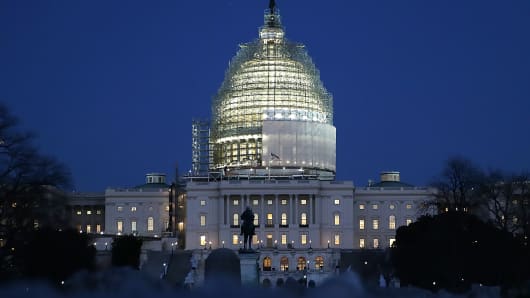April's employment report was encouraging after weak numbers for March. But if April is a leading indicator of where job growth is headed, then we still have a bumpy ride ahead. Currently, U.S. gross domestic product (the value of all goods and services America produces) is being depressed by our trade balance (the difference between our imports and exports), which had been declining since 2007, when the recession cut demand for imports. But, demand is now growing at a voracious level.
In the meantime, U.S. exports are stalling as our trading partners in Europe and the U.K. pursue fiscal austerity programs. This is coupled with unease over whether the U.K. will hold a referendum on its partnership with the European Union. Meanwhile, Greece is being starved by myopic International Monetary Fund restrictions. These uncertainties are weakening the euro, and strengthening the dollar.
Read MoreC'mon, Congress. These trade deals are a no-brainer!
The success of U.S. fiscal stimulus also has the U.S. economy outperforming other industrialized nations making the dollar stronger. So, a strong dollar and weak global demand is now hurting U.S. exports.
While construction employment showed a bounce back from March's weather, and automotive production followed suit, overall manufacturing employment was little changed and some areas of manufacturing actually lost jobs. Machinery, for example, lost 5,200 jobs.These are goods-producing sectors harmed by the current global market situation.
These trends should be a caution to the Federal Reserve and to members of Congress, being asked to sign a blank check over to yet another "trade" deal. In the case of the Fed, the first quarter numbers point to how fragile the economy is. Heavy snow and a strong dollar slowed GDP growth enough to bring the labor market to a crawl in March.
Read MoreWhy the US won't have OPEC to kick around in 2016
For three straight months, the Bureau of Labor Statistics has revised the previously announced payroll employment numbers downward. When that last happened in 2005, the labor market went into a stall; and when it next happened in 2007, it didn't end well. Because the euro zone and the U.K. are suffering from a fetish with fiscal austerity, the European Central Bank has finally responded to slow growth with a more accommodating monetary policy. But, that means the Fed must guard against raising U.S. interest rates and triggering an even weaker Euro.
The figures for wages were equally anemic. For sustained growth, real wages must rise with productivity; this fuels increased demand with increased income — not increased debt. But labor markets are not tight enough, which means wages will continue to lag behind the productivity gains we've experienced since 2009.
Congress is being asked by President Obama to agree to a set of investment provisions with a multilateral group of Pacific Rim nations, designed to make investing in those countries easier, and preventing environmental or labor regulations from limiting exports from those countries.
Read More13 famous logos with hidden messages
This "trade" agreement known as the Trans-Pacific Partnership (TPP) repeats the philosophy of the North American Free Trade Agreement: What's good for multinational corporations and allows them to set up shop in other countries to export goods to the U.S. is good for Americans.
These investment agreements do not promote rising wages, improved labor or environmental standards. Instead, they promote a race to the bottom and hamper democratic governments that want to improve their regulatory environments. Since Nafta, we've seen exploding U.S. trade deficits and stalled U.S. wage growth.
Today, the U.S. trade deficit is growing faster than the GDP. This is dangerous because it means that we are tipping toward a structural imbalance that cannot be easily addressed. In short, our foreign debt is rising faster than our income.
So, Congress must slow down any "trade" deal, until the imbalances of the past can be firmly addressed. And, simply repeating the same lines of arguments used to pass the previous agreements that got us on this path, will not do. We cannot recover our employment levels, and push to restore our wage levels with the current trade-deficit drag.
Commentary by William Spriggs, chief economist to the AFL-CIO and a professor in, and former chair of, the Department of Economics at Howard University. He previously served as Assistant Secretary for the Office of Policy at the United States Department of Labor. Follow him on Twitter @Wspriggs.


